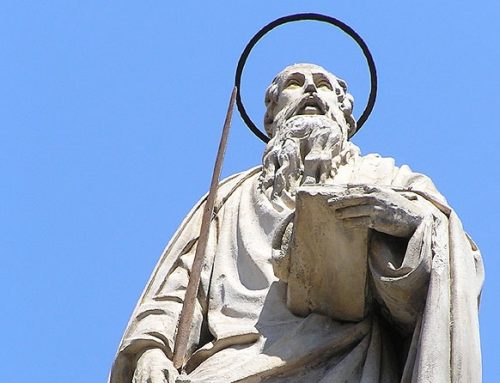What importance does Saint Paul has in the history of the Church?
The importance of Saint Paul in the history of the Church can be assessed by two principal factors:
The first factor is that Saint Paul exceeded Judaism. Already in the preaching of Christ this dimension was evident, as the Pentecost had confirmed. But nevertheless, it was St. Paul who spread the preaching of Christ among the pagans. In this sense, the Apostle was perfectly conscious of having received the mission of announcing the Gospel to the Gentiles, in the same way Peter’s mission was to the Jews.
The other factor is the notable and explicit position that the “theology of salvation” has in Revelation. This presupposes that man should be conscious at the beginning that he is separated from God and that he needs a Saviour. Among the authors of the New Testament, Saint Paul is the one who emphasized the most the centrality of Christ as a means of salvation. Being a Christian is identification with Christ and acceptance of His pre-eminent role in the redemption of all men. Christ is the Head of all creation. Therefore, the starting point of the evangelization that St. Paul preached is the awareness of the need to be saved.
All men, affirms the Apostle, desires eternal happiness and the perfect contemplation of God, not through blurred images but face-to-face. Nevertheless, before his union with Christ, he felt separated from Him. He experienced the pull of the “flesh”, the “body of death”, and sin. It was not caused by radical pessimism. Rather, it was a reality and historical. It was due to the sin of Adam. In Adam, everyone sinned and everyone has to resurrect with Christ.
In Saint Paul, the synergy of various cultural traditions is present. He received since his childhood a meticulous Jewish formation…
The family in which he was born and the education that he received were certainly guided by Divine Providence to forge him as the instrument that the Lord needed for the specific mission that later on he would receive. He was well-versed on Greek language and culture. He lived to the letter his being a Jew, and he was a roman citizen fully conscious of his rights, duties and the situation of the empire. Built upon the richness of his profile is his grand spiritual personality elevated by the vocation he received.
The primary formation that Paul received certainly came from his family who were practicing Jews (which he was very proud of). He was from the tribe of Benjamin (the same tribe of King Saul, from whom his name was derived). He was a Pharisee, interpreters of the Law. He was zealous in maintaining his family traditions. At the same time, he learned manual work with which he supported himself as it was the custom among the Jews at that time: he was a weaver of linen used in tents and also he knew the art of trading and the transport network of his time.
On the other hand, the formation he received directly from Gamaliel appears to indicate that his parents had plans to orient him as a Rabi (teachers of the Law). As fruit of his study and the lessons he received from such a great teacher, his thoughts were always centered on the Sacred Scriptures. He cites and comments on them many times and he considers frequently the promised salvation of Israel. His sense of history according to the Jewish traditions profoundly penetrates his theological vision.
What about St Paul’s helenistic training?
Regarding his formation in helenism we haven’t much information, but one can assume that, in studying at Tarsus, he must have gone to a school with a helenic teacher.
Not only that, but St Paul’s knowledge of Greek and his mastery of rhetoric suggest specialized study in some school of oratory of the period. It is possible, though not certain, that he went to Rhodes, where there was an important school of rhetoric and stoic philosophy. St Paul’s open and positive attitude towards the best Greek philosophy is reflected, not so much in his letters, as in his speech at the Areopagus of Athens, and, before that, in a speech at Iconium in Pamphylia. In any case, one has to remember that in Rom 1,20 St Paul doesn’t hesitate to affirm the possibility of reaching, by the use of human reason, the certainty of the existence of God.
The most important aspect of this helenistic dimension of his cultural formation is his decision to write all his letters directly in Greek. St Paul, even though he uses sources prior to him, belonging to Palestine and Jersualem, decided from the beginning and in a completely natural way to use koiné Greek so that all the civilized world of that time might understand him.
What other cultural factors influenced the Apostle’s personality?
The third – and without any doubt the most important – factor in his spiritual and apostolic formation was what he received directly from Christ, by means of spiritual experiences or personal revelations, and from the apostolic catechesis (as he himself states when explaining the words of the institution of the Eucharist). Without any doubt Paul was a Christian thinker and all his teaching is centred on Christ Jesus. Yet, the theological and apostolic vision of St Paul is not only Christian, but universal, “catholic”, as is evident from his repeated affirmations about the unity of the believers, in spite of their ethnic, geographical or cultural differences.
Another, perhaps less salient, aspect of the Apostle’s character is that Paul, as we know, was a Roman citizen, which suggests that he received his citizenship from his father. This characteristic, although it does not imply any special cultural formation, could have had a bearing on the Apostle’s thought, particularly from his captivity in Rome onwards. In this sense, one is struck by St Paul’s interest in establishing norms of behaviour in the Christian communities founded by him. Such interest in the legal and moral side of his apostolic and pastoral activity could come from his Jewish roots, but also from the legal mentality so apt to Latin culture and so characteristic of stoic thought.
And he was the one God chose to preach to the Gentiles…
The most decisive day of his life was his personal encounter with Jesus Christ on the road to Damascus. The light of the vocation brought sense to his life since the beginning up to that moment (his Jewish family of the Diaspora which were practicing Jews but at the same time open to the prevailing culture of his time, his pride as a roman citizen). He discovers the congruence between Divine Providence and the plan of God for him which is to preach the Gospel to all men, first to the Jews and later to the Gentiles. The experience that he had prefigures in some way the singular moment in the life of every Christian when the “why” and “purpose of one’s life” is known and when one is demanded to take the decision to permanently commit oneself to that mission.
The divine call demands a deep interior conversion. When Jesus revealed himself and Saint Paul understood that He was the glorified Messiah, Paul had to radically change his way of thinking which was similar to a fervent Pharisee. If before he considers that the way to God was through the Law, now he is convinced that the Law is useless, given that Jesus, the Messiah and the Son of God, was condemned according to the Law and was cursed according to the Law. If before he thought that the true Israel was the one from the line of Abraham and follower of the Law, now he understands that the true Israel are the followers of Jesus, those who are identified to Him. In his encounter with Christ on the road to Damascus, Saint Paul acquired a new vision of the plans of God which will configure his thoughts and conduct beginning from that moment.
To be more accurate, one has to emphasize that the ethic that Saint Paul presents to the Christians is not the ethic based on commandments in a manner similar to the Jews but rather, an ethic based on virtues. Among the virtues, faith and charity are underlined. There are two foundations on which the Christian life is based: the confidence Divine Filiation brings and the awareness to the call to sanctity. “This is the Will of God, your sanctification”. No one, since then, had dared to propose an end so lofty because Gentiles did not understand what sanctity is and because the Jews thought that only God is holy.
Nevertheless, he wasn’t exempted from tribulations in his journey…
The awareness of the vocation, and his decision to correspond fully to it, did not spare him from encountering interior and exterior difficulties. The Apostle continued to experience his personal limitations and the weight of sin, against which he continued to struggle.
Nevertheless, these limitations did not impede nor stop his apostolic zeal. The Apostle gave himself unconditionally to the expansion of Christianity. Although his apostolic journeys were full of difficulties, he went from one place to another, where it was more necessary in each moment to spread the Christian message, and adapted himself to all sorts of circumstances and ways of thinking. Immediately after his encounter with Christ, he addressed himself to the Jews in Damascus; and when he went to Jerusalem, he preached to the Helenists, that is to say, to the non-Palestinian Jews of Greek origin.
His first contact with the gentiles came much later, when he helped Barnabas in his work of evangelization. Afterwards, when he and Barnabas were sent by the Holy Spirit, he went to Cyprus and started to preach in the synagogues of Salamis. Later on Paul and Barnabas preached in the same way –starting in the synagogues– in Antioch of Pisidia, Iconium, Philippi, Thesallonica, Beroea, Corinth, Ephesus, and Rome.
As a fruit of that continued correspondence to God’s calling, at the end of his life he did not fear death nor judgment; he faced them with great confidence and serenity, believing in Whom he put his trust. In fact, the Apostle would give his supreme testimony during the reign of Emperor Nero in Rome; his martyrdom took place between 64 and 67 A.D.







Leave A Comment
You must be logged in to post a comment.